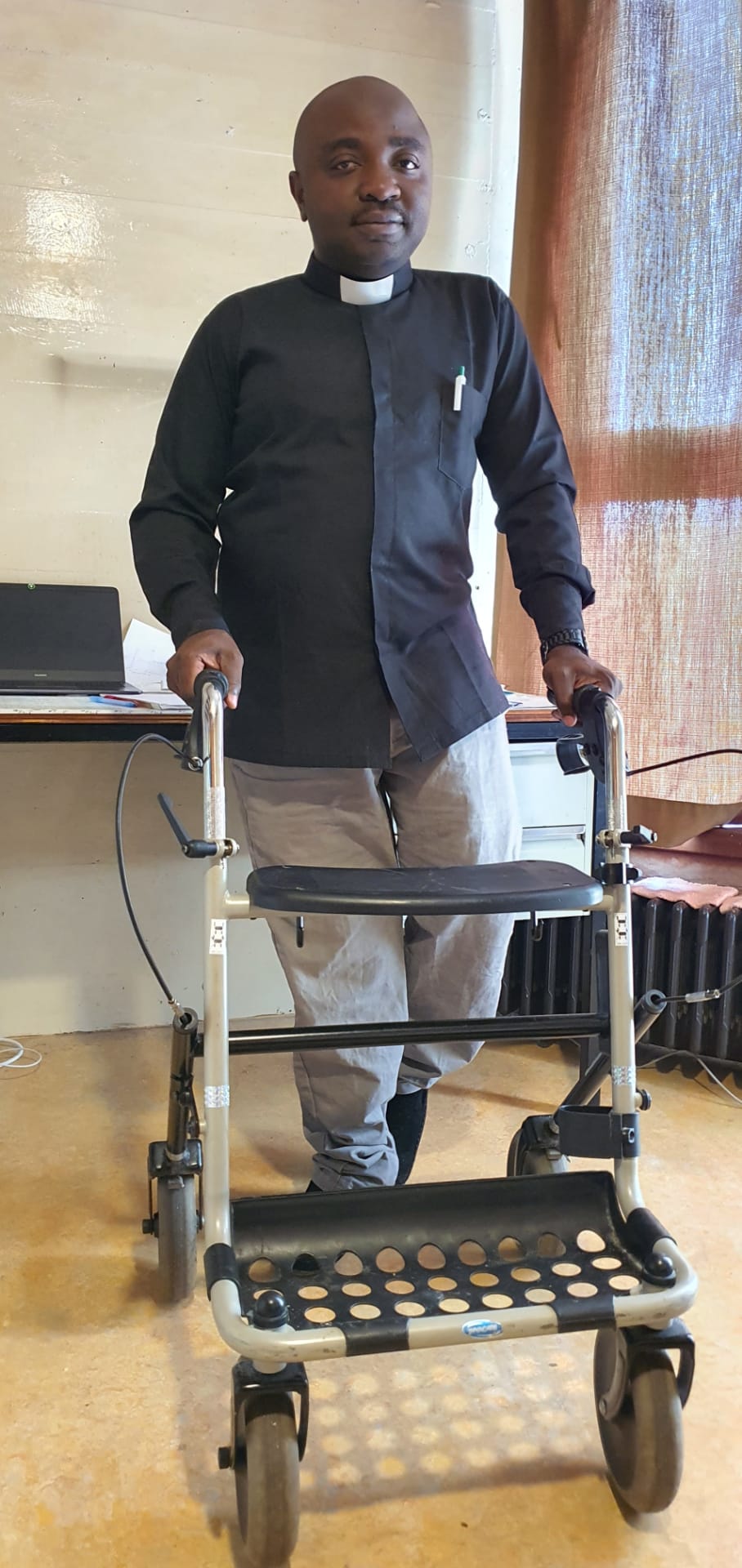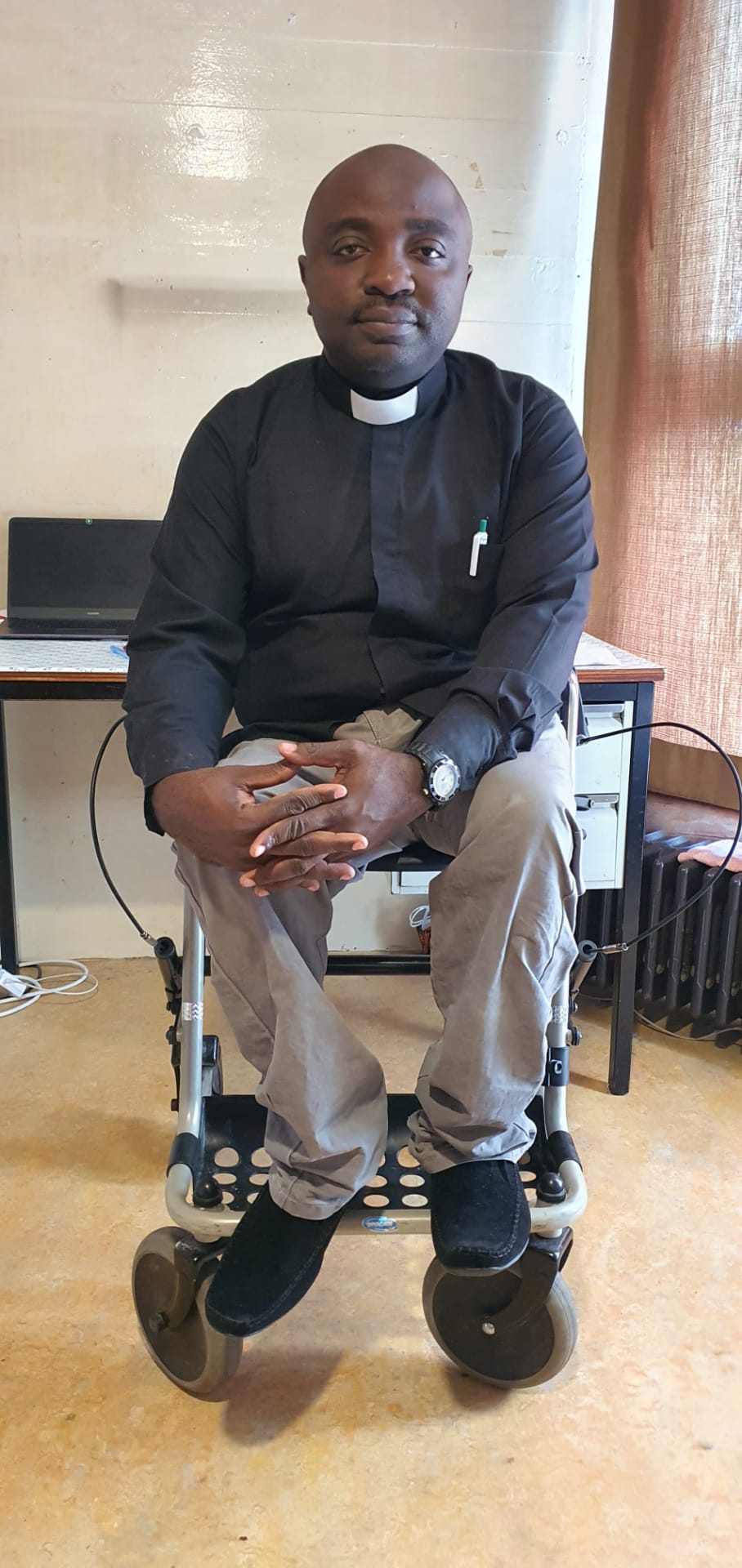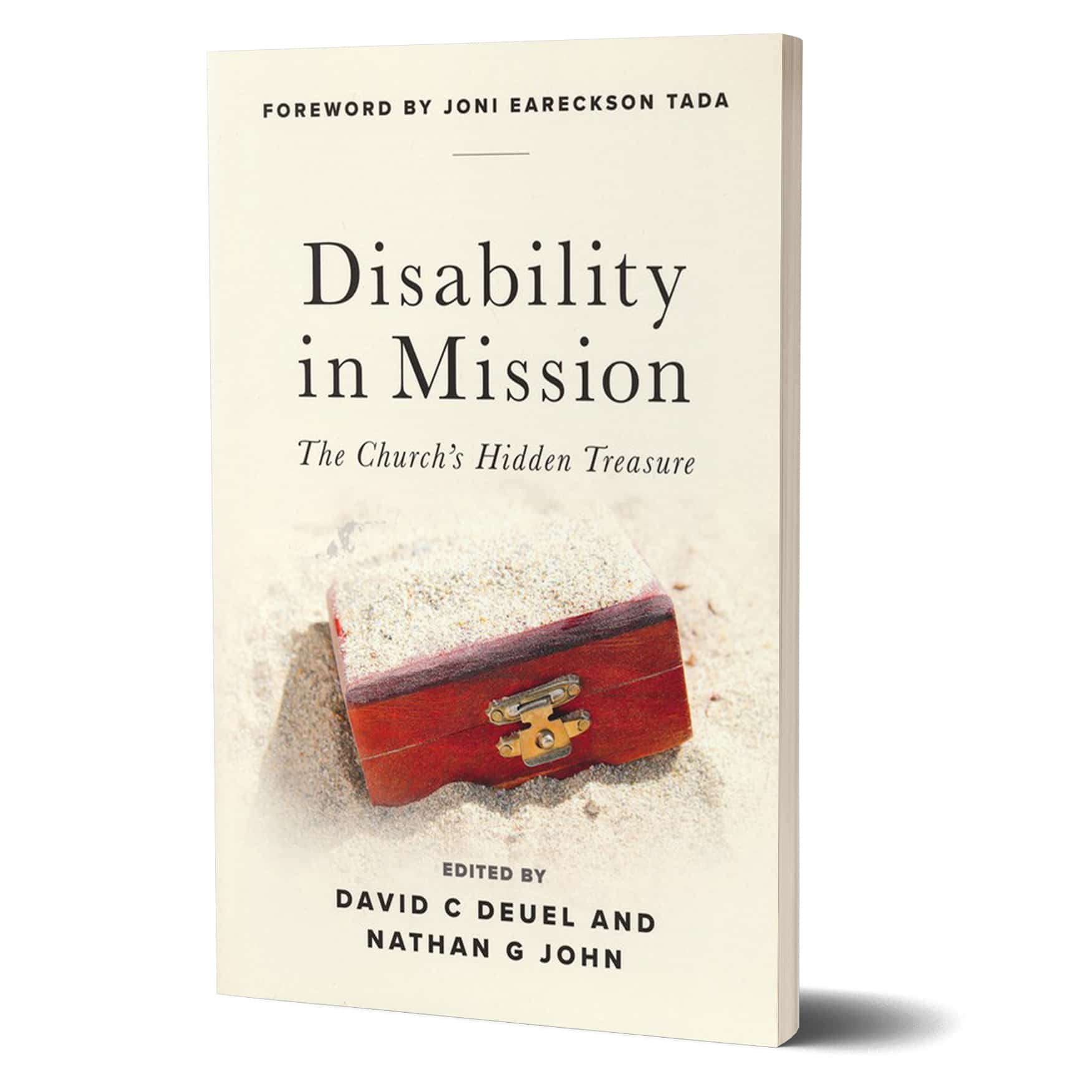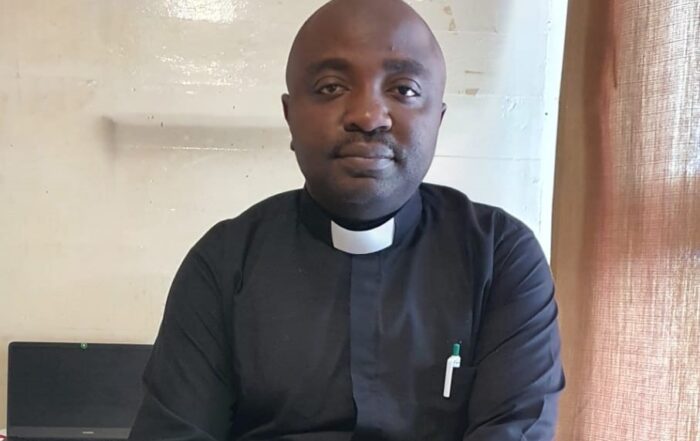From Rejection to Church, University, and Business Leadership in the Congo
“The Lord does not need our strength. He just needs our availability. As soon as we are available for him, he gives us his strength”
—Dr. Daniel Kyungu
When we think about people with disability in missions, our minds immediately go to the seemingly insurmountable challenges that they might face in the role as missionary or church leader. Daniel Kyungu’s story is a reminder that God delights in overcoming the odds. He pulls down barriers and removes obstructions effortlessly so that his called and gifted child, an empowered leader, not only succeeds in spite of disability but because of it.
A warm welcome to you, Dr. Kyungu. Thank you for reaching out to me and introducing yourself on social media. It is an honor to speak with you regarding the Joni and Friends blog. Thank you also for the privilege of being your Lausanne mentor. I’d like to ask you a few questions that will help us understand and appreciate the amazing testimony of disability in ministry that God has given you.
DAVE: Tell us about yourself. Where is your home and what is your story?
DANIEL: My name is KYUNGU TCHIKALA Daniel. I am 36 years old and am a pastor, teacher at the University of Lubumbashi, and doctoral student in the field of human resource management / professional integration of people with disabilities. My research for the doctoral thesis is oriented towards the professional integration of people with disabilities, because I am myself a person with a disability. My home is in the Democratic Republic of the Congo (DRC), Africa. I was born in Lubumbashi, on September 17, 1983 and have a twin. I wasn’t born with a disability but developed one at the age of 11.
DAVE: What is your disability?
DANIEL: I have had a physical disability for over 24 years. I can stand up, but I cannot walk without leaning on someone’s shoulder or a wall. I do not know the name of my disability because I have never consulted a doctor for a diagnosis. My parents did not have the money to pay for medical care, so consequently, neither have I been treated in a hospital by doctors. I just rely on the help of the Lord.
DAVE: What difficulties has your disability given you?
DANIEL: I have very limited mobility. Socially, I lost a lot of my friends when I developed my disability, so I am often isolated. As you might imagine, living alone causes me much sadness and stress in life. In fact, people I do not even know often insult me because of my disability when they meet me. What is more, employers refuse to hire me because of my disability.
DAVE: How has disability changed your life?
DANIEL: Before acquiring the disability, I was ‘normal’. I played with others and went to school. The most difficult consequence of my disability is alienation. When my disability developed, my childhood friends were disturbed to see the change. One day they came to the window of my room and shouted at me, “Daniel, disabled, Daniel, disabled.” These cries plunged me into the depths of despair, and I planned to kill myself. I spent a year in my room hardly going out for fear of insulting cries from my childhood ‘friends’.
Some people told my family that witchcraft caused my disability. They said that spirits had called upon me to sacrifice my parents but when I refused, spirits brought disability upon me as punishment. As you can imagine, this was terribly distressing. If that wasn’t enough, the war in the east of our country in 1998 forced my family to leave our city, Kalemie. Since I couldn’t flee with them because of my disability, I had to stay behind in the conflict zone in Kalemie until 2003. I was abandoned in a war zone at the age of 15 and beaten and humiliated by soldiers. This was a difficult time. One day I was walking with my crutch and a soldier picked up stones and threw them at me until his supervisor stopped him.
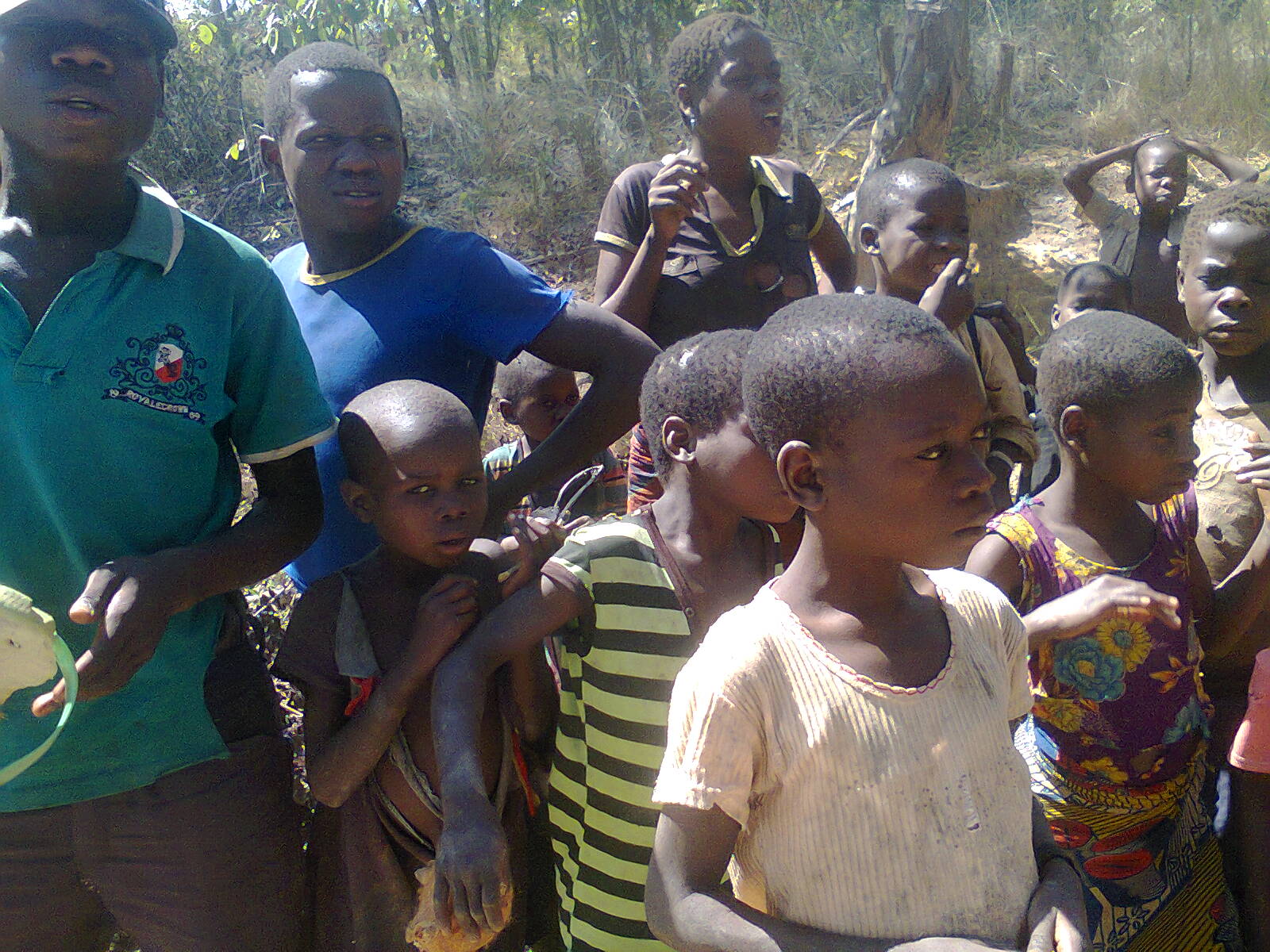
DAVE: What was it like to grow up with a disability in the Congo?
DANIEL: According to the Swedish International Development Cooperation Agency 2015 report, the DRC may be one of the world’s most challenging places for people with disabilities to live. More than 90 percent are illiterate and 96 percent live in inhumane and degrading conditions. Living with a disability in the DRC is compared to living in hell. I experienced it.
DAVE: As an adult how did people treat you because of your disability?
DANIEL: There were people who helped me a lot, but disability integration has been a big challenge. I remember being asked by classmates at university, “what will you do with your university degree when you get it? You’re sick, your place is in the hospital.”
DAVE: Why do you think they treated you this way?
DANIEL: In Africa, particularly in the DRC, people believe that disability is a curse. In some families, children with disabilities are hidden. Parents are ashamed of them. They spend their entire lives living in the back rooms of the home rarely coming out to interact with people outside the family.
DAVE: How did you come to Christ?
DANIEL: I was born in a Christian family and attended church from an early age. But I didn’t receive Jesus Christ personally until after experiencing disability during the war in the east of the country. One day I pleaded with God to deliver me from the trauma and anguish that crushed me. It was here that I personally experienced the grace and the love of the Lord. Joy invaded my heart. Since then, everything has changed in my life. The anxiety has changed into immense joy. Since that day my disability has stopped oppressing me. Finally, I experienced true freedom in Jesus Christ when I received him as my Lord and my Savior. I was soon baptized and eventually became an evangelist, then a pastor.
DAVE: How did you find the opportunity to go to school, get a doctorate, and become a pastor, evangelist, university professor, and denominational leader?
DANIEL: I am truly a beneficiary of God’s grace. My disability should have kept me from these leadership roles. But my family members and friends supported me during my studies. For my doctoral program, I was awarded a scholarship. A supervisor persuaded me to use my giftedness in teaching to serve my country. In God’s plan, I was eventually selected to be a denominational leader. The Holy Spirit helped me a lot as is written in the prophet Zechariah:
“Not by might nor by power, but by my Spirit,’ says the Lord Almighty”
—Zechariah 4:6 (NIV)
At a national synod, the pastors of our denomination decided to entrust me with the duties of leading the church after the death of our bishop. Not long after that, I was selected to be a denominational leader.
DAVE: Has the Lord used anyone in your life to help you respond to His call and develop your giftedness?
DANIEL: Yes, there are people who have helped me. But I would like to mention one: He is the former dean of the Faculty of Economics and Management at the University of Lubumbashi, Professor Mbayo Musewa Laki Maurice. Like me, he has a physical disability. For this reason, his help was very precious. He even paid for my studies at the University. Today he is still my scientific supervisor.
DAVE: What impact will having a disability have on your new leadership role in the church?
DANIEL: I have reduced mobility. This makes it difficult to visit all the Lord’s sheep. I love His sheep. Daily, I must overcome the challenges of my disability in my role as a church leader.
DAVE: Has your disability given you any advantages as a leader? If so, in what ways?
DANIEL: Yes, it certainly has. My disability has shaped my character. I have had to become tenacious, creative, and persevering. I am committed to finding solutions where it appears there are none. Although not commonly talked about, this is the positive side of disability. You must learn to make life work by God’s grace.
DAVE: How will your disability affect the way that you assist and support other people with disabilities in your ministry?
DANIEL: Crucially, my research for the doctoral thesis is oriented towards the professional integration of people with disabilities. What is more, I was elected 2nd Bishop of the 1st Community of the Church of Christ in Congo, on 25 July 2019. I will be crowned in Lubumbashi at an unforeseeable future date determined by the COVID-19 conditions in our region. This leadership role will give me unprecedented opportunities to help other people with disabilities find space to serve in Christ’s church; some who are called and gifted will serve in leadership roles like I do and some will go out on mission. A new day has dawned on people with disabilities in the churches of the DRC.
On a practical level, I am committed to helping other people with disabilities. For example, I talk to them about the love of Christ and even train them in entrepreneurship and business management since I’m an entrepreneurial trainer from the University of Maastricht. When I meet them, they are surprised that I talk to them with love because they are usually rejected due to their disability. They consider me to be their brother in Christ. Like everyone else, they are looking for hope in life. This is especially true because the majority of them live in desperate conditions. The love of Christ can give them the joy of living despite all the difficulties they face.
DAVE: Will you try to help other people with disabilities become leaders like you, particularly missionaries?
DANIEL: The Lord has given me the responsibility to lead in his local church. Along with this leadership responsibility, I desire to make training people with disabilities one of my priorities as well as sending them out. My most passionate dream is that the Lord will use me as a channel to train people with disabilities who will draw crowds of other people with disabilities to Jesus Christ and make them disciples. The specific goal that I have set for myself is to produce 10 Christian leaders and disciples of Jesus Christ with disabilities in the Democratic Republic of Congo in the next 10 years.
DAVE: What would you like to say to people who are amazed that you are a pastor, evangelist, professor, and denominational leader?
DANIEL: Yes, I am a pastor, an evangelist, a professor, a denominational leader, and an entrepreneur. The love that I have for others empowers my multiple responsibilities. In addition to evangelizing, discipling, and training people with disabilities, I hope to help make life better for them. My love for my neighbors with disabilities steers all of my efforts in the right direction. It does not come from me, it’s the gift of the Holy Spirit.
DAVE: What would you say to other people with disabilities to encourage those who are called and gifted to pursue mission and ministry leadership?
DANIEL: The message I can give to other people with disabilities who aspire to become leaders in the Christian world is this: The death and resurrection of Jesus Christ enables us to come into connection with the power of God. Our trust must rest on the Lord who has the power to make us strong beyond our human imagination. In the eyes of the Lord, there are neither weak nor strong. Only his spirit makes us strong (Zechariah 4: 6). The Lord does not need our strength. He just needs our availability. As soon as we are available for him, he gives us his strength.
DAVE: Thank you for sharing your testimony and life story with us, Daniel. God has amazingly applied his grace to your life in so many ways. Is there one final message you would like to send to those who want to understand and appreciate the significance of you becoming a leader who, by God’s design, has a disability and has suffered as a result?
DANIEL: People with disabilities need to know Jesus Christ. Regardless of whether we are in the Congo or somewhere else, the best thing we can offer them, and the world is the love of our Lord in the gospel.
Dr. Daniel Kyungu’s’s story pulls together two powerful Disability in Mission themes; Daniel’s personal tenacity and innovation rooted in his commitment to Christ, and the hand of God supporting Daniel through the agency godly leaders. This support is not charity. In fact, it is no different than we might expect from any mentor to mentee relationship. Can called and gifted people with disabilities participate in missions? Yes, they can.
Written By—Daniel Kyungu
KYUNGU TCHIKALA Daniel is the responsible pastor (Bishop) of the first community of the Church of Christ in Congo: “Africa Inland Church Congo, in the Democratic Republic of Congo”.
Edited by David C. Deuel & Nathan G. John
Disability in Mission
Disability in Mission: The Church’s Hidden Treasure outlines a radical change in approaches to missiology, missions, and praxis for the twenty-first-century global cultural context. It explores a pattern whereby God works powerfully in missions through disability and not in spite of it.
Pray with Us
Heavenly Father, we come before you requesting a miracle. Lord of disability, please change our hearts. We confess that we doubt or dismiss people with disabilities. But worse, we pridefully make them objects of pity when instead we should see your calling and giftedness in their lives.
Please use this book’s testimonies of your sufficient grace. May the many missionary lives lived faithfully with disability remind us that called and gifted people with disabilities are platforms for your enablement, showcases for your glory. Remind us that disability is your stage for shocking a watchful world.
We believe that you can and will heal all disabilities. But on your disability stage, display your power by changing our hearts.

